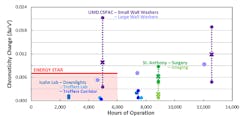DOE Gateway report documents LED lighting performance in four indoor applications
Installations of SSL luminaires, lamps, and retrofit kits completed over the course of 2012–2015 have been studied by the DOE, revealing details on reliability, lumen maintenance, chromaticity shift, and other operational parameters.
The US Department of Energy has released another report in its Gateway series covering real-world installations of solid-state lighting (SSL) technology in general-lighting applications — in this case focused on four very different indoor applications. The projects span new construction to large-scale retrofits and involved the Hilton Hotel in downtown Columbus, OH; St. Anthony Hospital in Gig Harbor, WA; the Carl Icahn Laboratory at Princeton University in Princeton, NJ; and the University of Maryland’s Clarice Smith Performing Arts Center (CSPAC) in College Park, MD. The long-term study does reveal energy savings, but the DOE concluded that the projects illustrate other reasons ranging from maintenance savings to controls to improved light quality that justify the installation of LED-based lighting.
Interested in articles & announcements on LED lighting?
The projects covered in the Gateway report, while all indoors, cross a broad application space and also include new construction and retrofit applications. The Columbus hotel was a new construction and involved 3700 downlight luminaires in 2012. St. Anthony Hospital was completed in 2014 and involved 1262 integral lamps installed as replacements for compact fluorescent lamps (CFLs). The Icahn Laboratory included LED retrofit kits for both CFL downlights and linear troffer fixtures. And the CSPAC project included 135 LED modular light engines installed in existing wall-wash fixtures in 2014.
Performing arts project
The DOE had previously published a Gateway report on the CSPAC project back in 2015. The early results indicated lower light levels than the incumbent lighting, but lighting that was considered acceptable by the facility. Meanwhile, the LED retrofit has greatly reduced what had been near-constant maintenance on the old halogen lighting that operated 7300 hours per year.
The CSPAC project was based on small linear modules from TerraLux. The company first announced the products back in 2012 and has continued to improve the design with new models since. CSPAC retrofitted a total of 87 luminaires with larger versions using two of the modules and smaller versions one.
The US DOE Gateway report on several indoor LED lighting projects measured chromaticity changes over a number of hours of operation.
After 17,000 hours of operation, the university is happy with the project given that there has been essentially zero required maintenance. But the DOE did document chromaticity shift at 12,000 hours that may be greater than what would be acceptable in some applications. Energy Star arbitrarily sets acceptable shift at 0.007 in the ∆u'v' color space. Some of the luminaires have remained under that level but most are over with a high around the 0.02 range and average performance well above Energy Star — although it’s important to note that TerraLux did not claim color maintenance within the Energy Star guidelines. Meanwhile, the SSL installation has delivered 80% energy savings relative to the prior halogen lighting.
Hilton hotel
The Hilton project utilized Eaton (formerly Cooper Lighting) Business Portfolio downlights. The DOE measured seven of the lights 17 months after installation or at about 4900 hours of operation on average, and then again two years later at the 12,000-hour mark. The DOE did not gather data required to calculate ∆u'v' shift but measured changes in CCT have been slight. And color rendering (both Ra and the red R9 sample) remained consistent, leading to the conclusion that the LED lighting had remained stable.
Lumen depreciation was even more impressive. Indeed, light levels increased 3–7% in different areas of a guest room. Note that it is common to see an increase in the early lifetime of LED sources. The DOE stated that the light levels met Illuminating Engineering Society (IES) requirements for guests of any age.
Reliability has also been excellent in the hotel project. Early on, six drivers had to be replaced in the luminaires, and after 14,500 hours of operation four flickering luminaires have been replaced. The DOE did evaluate installed dimmer controls, which work properly but use a small slide dimmer that some guests have not intuitively understood how to use. Occupancy sensors in bathrooms have largely worked well with the exception that some guests have gone to the trouble of disabling the sensors that were set to extinguish the lights after 30 minutes of vacancy.
Hospital lighting
The hospital project was unique in that it involved the installation of ballast-compatible Lunera Lighting Helen LED lamps in existing fluorescent fixtures. The DOE has monitored the performance of seven downlights in a surgical waiting area and ten fixtures near the radiology imaging center. The DOE noted that leaving the ballast in place was by far the lowest-cost option for the hospital looking to retrofit public spaces. But the agency also warned that the project will warrant a reexamination of the economics as the CFL ballasts reach their rated lifetimes. The CFL fixtures were five years old at the time of the retrofit.
The report documents the hospital lighting after 8800 hours of usage. Chromaticity is largely within the Energy Star 0.007 level, although a few products measured above that number. Still, average performance is very good. And the products have exhibited lumen maintenance in the 80–90% range. The lamps do have lower lumen output than the CFL lighting but remain above IES recommendations. Energy savings total 59%.
Princeton University
We briefly covered the Icahn Laboratory retrofit as part of a larger Princeton initiative launched in 2014 to install 100,000 LED fixtures across the campus. The lab was one of the first lighting projects undertaken as part of the Princeton Sustainability Plan that seeks to reduce the 2020 carbon footprint of the campus to 1990 levels.
Energy savings at the lab are good but not great. There were 245 downlights retrofitted in corridors, lobbies, and conference rooms using TerraLux DR8 modules. And those products are delivering 60% savings relative to the prior CFL lamps. But the 815 2×2-ft troffers installed in labs and offices and that used linear fluorescent lamps were already quite efficient. The MaxLite retrofit kits deliver only 24% savings.
Both the CFL and troffer retrofits have showed stable color performance through7400 hours of usage, with levels well below the Energy Star level. And lumen maintenance remains near 100%.
The only disappointing aspect of the Icahn project comes in the area of controls, where the project originally intended to rely heavily on occupancy sensors to further increase energy savings. But technical difficulties with a plan to have the sensors communicate using an existing building automation network have forestalled the controls plan for now.
We have reported on several other projects on the Princeton campus. For example, the DOE issued another Gateway report on an outdoor lighting project in 2015. And the university has retrofitted its Jadwin Gym with LED high-bay fixtures.
You can read the detailed DOE Gateway report on the indoor lighting projects at the DOE SSL website.

Maury Wright | Editor in Chief
Maury Wright is an electronics engineer turned technology journalist, who has focused specifically on the LED & Lighting industry for the past decade. Wright first wrote for LEDs Magazine as a contractor in 2010, and took over as Editor-in-Chief in 2012. He has broad experience in technology areas ranging from microprocessors to digital media to wireless networks that he gained over 30 years in the trade press. Wright has experience running global editorial operations, such as during his tenure as worldwide editorial director of EDN Magazine, and has been instrumental in launching publication websites going back to the earliest days of the Internet. Wright has won numerous industry awards, including multiple ASBPE national awards for B2B journalism excellence, and has received finalist recognition for LEDs Magazine in the FOLIO Eddie Awards. He received a BS in electrical engineering from Auburn University.




![The DesignLights Consortium continues to make progress in shifting outdoor lighting products and implementation practices toward a more restrained and thoughtful strategy. [Image does not represent a DLC qualified fixture.] The DesignLights Consortium continues to make progress in shifting outdoor lighting products and implementation practices toward a more restrained and thoughtful strategy. [Image does not represent a DLC qualified fixture.]](https://img.ledsmagazine.com/files/base/ebm/leds/image/2024/08/66be810888ae93f656446f61-dreamstime_m_265700653.png?auto=format,compress&fit=&q=45&h=139&height=139&w=250&width=250)
